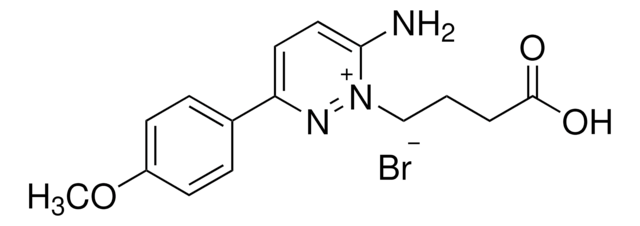Wichtige Dokumente
T200
(1,2,5,6-Tetrahydropyridin-4-yl)methylphosphinic acid hydrate
≥97% (HPLC), solid
Synonym(e):
TPMPA hydrate
About This Item
Empfohlene Produkte
Qualitätsniveau
Assay
≥97% (HPLC)
Form
solid
Farbe
white to off-white
Löslichkeit
H2O: 16 mg/mL
DMSO: insoluble
SMILES String
[H]O[H].CP([O-])(=O)C1=CC[NH2+]CC1
InChI
1S/C6H12NO2P.H2O/c1-10(8,9)6-2-4-7-5-3-6;/h2,7H,3-5H2,1H3,(H,8,9);1H2
InChIKey
GXVWAQPRAQORGS-UHFFFAOYSA-N
Anwendung
Biochem./physiol. Wirkung
Leistungsmerkmale und Vorteile
Angaben zur Herstellung
Rechtliche Hinweise
Lagerklassenschlüssel
11 - Combustible Solids
WGK
WGK 3
Flammpunkt (°F)
Not applicable
Flammpunkt (°C)
Not applicable
Persönliche Schutzausrüstung
Eyeshields, Gloves, type N95 (US)
Analysenzertifikate (COA)
Suchen Sie nach Analysenzertifikate (COA), indem Sie die Lot-/Chargennummer des Produkts eingeben. Lot- und Chargennummern sind auf dem Produktetikett hinter den Wörtern ‘Lot’ oder ‘Batch’ (Lot oder Charge) zu finden.
Besitzen Sie dieses Produkt bereits?
In der Dokumentenbibliothek finden Sie die Dokumentation zu den Produkten, die Sie kürzlich erworben haben.
Kunden haben sich ebenfalls angesehen
Unser Team von Wissenschaftlern verfügt über Erfahrung in allen Forschungsbereichen einschließlich Life Science, Materialwissenschaften, chemischer Synthese, Chromatographie, Analytik und vielen mehr..
Setzen Sie sich mit dem technischen Dienst in Verbindung.








